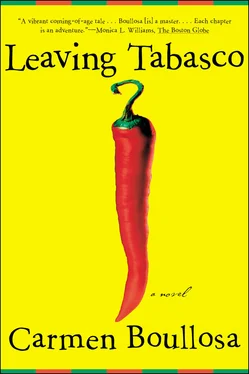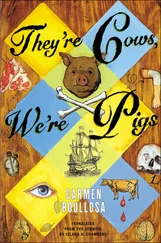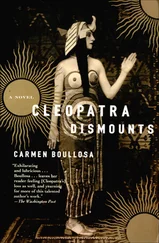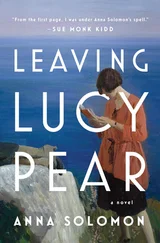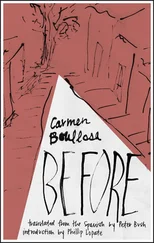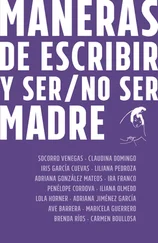“Here!” I said to her.
She made no answer.
Before accepting what I had to offer, she opened her fan and fanned herself, at the same time rocking the chair. She took the fruit-pole and checked it carefully.
“Leave it in my room. See if it fits in. It’s really long.”
My choice didn’t seem to go down too well with her. I ran to do as I’d been told and came back. I stood beside her. Without opening her eyes, she said, “What do you want?”
“I brought you a couple of things, Mama. I want to give you another present.”
“Present? The pole was what you owed me, don’t you think?” she replied, still without opening her eyes.
I gave her the package and she opened it at once. I noticed a shock of surprise when she saw the contents.
“Where did you get this?”
“I went to the market with Dulce. Then she got lost and I went looking for a present for you. I got the pole first in the hardware place and then I saw the stall with the shawls. I bought it for you with the money Uncle Gus gives me when he comes on visits. I’ve saved it all. Don’t you like it? If you don’t like it, there’s no problem! I’ll go change it.”
My explanation calmed her and the scarf couldn’t fail to please her, it was so lovely. She ran her hand over my hand in a careless imitation of a caress.
“It’s very pretty.”
Old Skin-and-Bones, as the vendor had called her, came dashing over to us, carrying a broom in her right hand, with her arm extended, as if the broom were a weapon.
“And what’s that?” she asked, halting abruptly on seeing the scarf in Mama’s arms.
“Isn’t it pretty?” said Mama, smiling.
“Pretty, for sure. Where did it come from?”
She listened only to the first part of the story and then carried on with her business, not staying to hear Mama’s version to the end, a version much more elaborate and far less true than my own. She went off, broom at the ready, hurried and stiff-backed, en route to some arduous battle.
I’d have liked to interrupt her. I’d like to have flourished my long fruit-pole and challenged her to a duel. Her bit of a stick against my fruit-picker, her false antiquity against my overlooked infancy, her military mind against my sense of joy. It really had brought me joy, my trip through the tent of scarves, wraps, and shawls that the vendor had built for me, even if only for a few minutes. O how happy I felt!
But my desire to challenge her and the explosion of joy that threatened to burst my lungs came collapsing back down to earth, like the scarf in the garden, when, seconds later, Dulce burst in, all upset, her face tense, like a raging meteorite aimed directly at me. She scolded me for getting lost in the market, as if it had been my fault, and after her came Grandma to scold her for having left me alone, and after her came Mama, saying that it didn’t really matter, going on and on, pulling at Grandma’s sleeve, getting into a snit because she was paying too much attention to me and Dulce, and Grandma turning on Mama, saying that the Gypsies or the Chinese could have easily stolen me away, and Dulce still attacking me tooth and nail, and then Grandma giving it to Dulce, because, in addition to not having taken proper care of me and exposing me to a thousand imaginary perils, she had forgotten the last of the three errands, had bought the wrong thing on the second, and had let herself be charged double the actual price on the first.
The next day was Sunday and the household followed its regular routine for the day. On the seventh day we dolled ourselves up in our finery and went to the nine o’clock Mass, the last one of the morning, where we mingled with the better sort of people. After mass we ate breakfast at the house of the parish priest, on a lovely, cool terrace, surrounded by plants. From the roof of beams and tiles hung birdcages and hanging baskets always filled with flowers and buds on the point of opening into more flowers. The floor was mosaic, the chairs were of wood. On the long table was spread a white tablecloth embroidered in bright colors by the tireless nuns. They also were responsible for the exquisite Sunday breakfast: tamales, atole , enchiladas, meat pies, sweet pastry, and bread rolls, all baked in the convent kitchen. Three of the nuns breakfasted with us, the ones charged with looking after the priest. They dressed in light gray, with a starched white veil on their heads, as stiff as a cap. The priest himself, a tall, dark, handsome man of strapping build, who wore delicately framed spectacles which lent him an inexplicable air of sympathy, was the idol of the nuns, the object of their profane devotion, their private god. They were also fond of us, and on Sundays we formed part of their happy family. They trotted here and there, attending to everybody, and when they sat down they felt responsible for keeping the conversation lively. They never stopped talking, telling us stories, gossip, legends, and scandalous rumors, until it was time for them to argue over the embroidery of the tablecloth. That moment always came. Then they forgot about us completely and pushed plates, cups, mugs, bowls, napkins, and cutlery to the other side of the table, prattling on about where another flower was needed, more branches, another bunch of grapes, or what petal should go on what stem, what leaf on what branch, disagreeing among themselves, each defending her own opinion against the others with a glib tongue and even using a fingernail on the tablecloth to demonstrate what shape a leaf ought to take or where a petal was missing, and then proceeding to smooth out the scratched cloth with the edge of a spoon to prove that this new addition had destroyed the harmony of the whole composition, and on and on.
The rest of us got up from the table, but they remained, arguing their points, getting more heated every minute, until they literally climbed onto the table, all dignity gone, crawling around, disputing one detail after another of the cloth, somehow managing not to soil their stiff veils with sauces and coffee dregs. Then the priest marched off with Mama and me to his jeep, Grandma disappeared, and we drove out of town to one of the nearby ranches, to participate in the mass. Both of us acted as his assistants. During the mass itself, I passed around the collection plate and Mama cleaned up the sacristy. Before and after the service, she helped the priest with his robes and packed them carefully in the priest’s small suitcase before we filed off to our next destination, which might or might not have a church or a chapel. The priest was so eager to say Mass that he would have done it in the middle of a swamp or in the burning sun or the pouring rain.
When it came to preaching at Mass, the priest had no equal, but en route it was Mama who wouldn’t let him get a word in edgewise. I don’t know what she said to him. The dusty roads were in appalling condition, the jeep bounced around endlessly, squeaking and squealing, and as they had sat me in the back I couldn’t hear a word. But it gave me a good feeling to see her so animated, unlike the rest of the week. She had awoken from her lethargy. She had flowered. She was gesticulating, moving her hands, her whole body, with grace and assurance. He’d turn to look at her and nod his head in agreement or shake it in disagreement, and then immediately return his attention to the winding road, with its potholes, ridges, and dangerous rocks that could have holed the gas tank, which in fact they had done on one occasion. That time we were stuck without gas, because it had all poured out of the damaged tank, but we were lucky because on that little-traveled road we came across another vehicle, a wagon loaded with sugarcane — like ours, it was good for little else than filling the jungle with its roaring and bucking — but at least it rescued us. Mama and the priest sat behind, climbing up on top of the load, and they put me inside with the driver. I could never forget that trip, even though I slept all the way home, because Mama arrived home covered in scratches from the cane and it was a week before she quit complaining of her numerous pains. Every time she let out a whine, Grandma would turn on her with “But why didn’t you put the kid up top? Nothing would have happened to her. Kids are made of rubber.” And every time she said it, I’d be overcome with shame for my thoughtlessness and for having hurt Mama in such an ugly way.
Читать дальше
